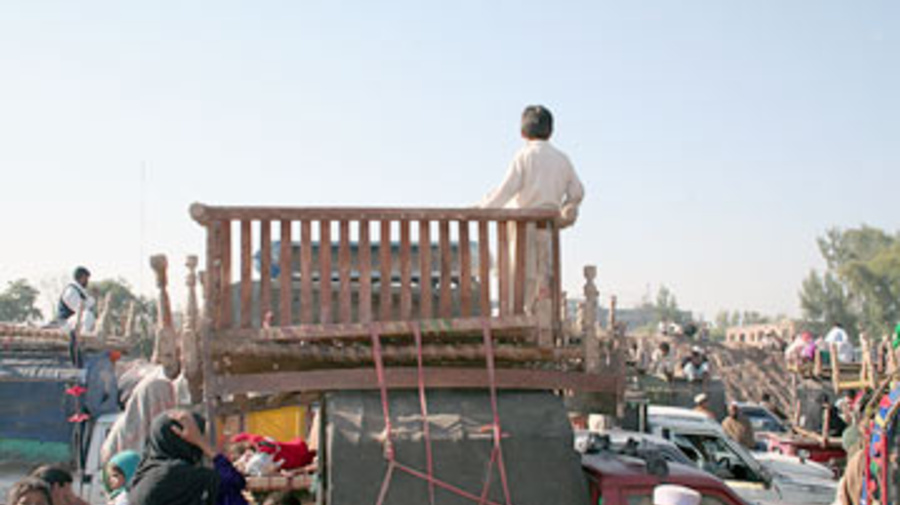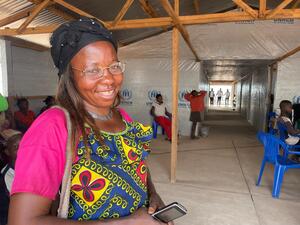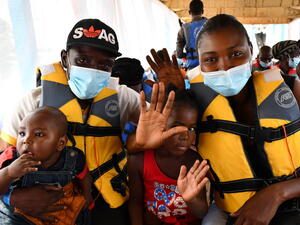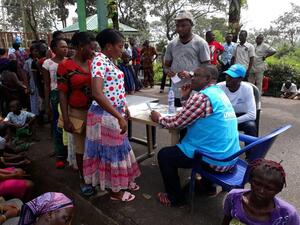Afghan returnees from Pakistan cross 3 million mark
Afghan returnees from Pakistan cross 3 million mark

Crowds of unregistered Afghans waiting to repatriate from Peshawar in Pakistan's North West Frontier Province.
ISLAMABAD, Pakistan, April 10 (UNHCR) - More than 3 million Afghans have voluntarily repatriated from Pakistan with UNHCR assistance since 2002, making it the largest such operation in the refugee agency's history. However, more than 2 million Afghans are still in exile in Pakistan, a protracted situation that can only be resolved with continued international support.
Since UNHCR started assisting returns to post-Taliban Afghanistan in 2002, a total of 3,009,484 Afghans have been processed to return home from Pakistan. The number includes more than 1.56 million in 2002; 343,074 in 2003; 383,598 in 2004; 449,520 in 2005; 133,015 last year and over 135,000 so far in 2007.
Some 61 percent of the returnees left from North-West Frontier Province, 16 percent from Balochistan, 14 percent from Punjab/Islamabad and 9 percent from Sindh province in the south. More than 860,000 Afghans have also been assisted home from Iran.
"In the last six years, this operation has seen many ups and downs, from the mass returns of 2002 to the slow pace of repatriation in 2006," said Kilian Kleinschmidt, UNHCR's assistant representative in Pakistan. "These fluctuating trends reflect the voluntary nature of repatriation, and we have tried our best to help Afghans make informed decisions on if and when they should go home."
The majority of returnees from Pakistan have headed to eastern and south-eastern Afghanistan, as well as Kabul and Kunduz provinces. UNHCR works with the Afghan government and partner agencies to provide shelter assistance, income generation and vocational training to help the most vulnerable returnees reintegrate in their home areas, while advocating for returnees to be included in national development plans.
As Afghanistan struggles to recover from the ruins of decades of conflict, hundreds of thousands of Afghans remain in exile in the region, unable or unwilling to return for the moment.
In Pakistan, more than 2.15 million Afghans were recently registered in a government exercise that provided them with Proof of Registration (PoR) cards recognising them as Afghans temporarily living in Pakistan. The card gives registered Afghans temporary protection up to December 2009.
Afghans who did not register themselves and do not have PoR cards have been given up to April 15 to repatriate in safety and dignity with UNHCR assistance averaging $100 per person. After this date, the government will consider them as illegal immigrants to be dealt with under national laws.
As the deadline approaches, hundreds of overloaded trucks are approaching UNHCR's voluntary repatriation centres (VRCs) every day, a scene reminiscent of the 2002 mass returns.
"The challenge at the moment is to sift through hundreds of families every day to separate genuine returnees from those who are just here for the cash grant," said Kleinschmidt. "We appeal to the Afghan community not to allow bogus returnees to block the repatriation process for those who genuinely want to be assisted home by April 15."
He added that unprecedented anti-fraud measures taken at the VRCs include thorough interviews, fingerprint biometrics, iris verification and the use of election ink to prevent recycling. People found abusing the system will be arrested.
Assisted voluntary repatriation for registered Afghans with PoR cards will start after April 15 and continue till the end of the year.
"Voluntary repatriation is the preferred solution to the protracted Afghan situation in Pakistan," said Kleinschmidt. "At the same time, there will be groups of Afghans who won't be able to go back and will need other solutions."
He added that UNHCR is currently analysing information collected through the registration exercise in order to identify individual Afghans who continue to need international protection and assistance.
By Vivian Tan in Islamabad, Pakistan








